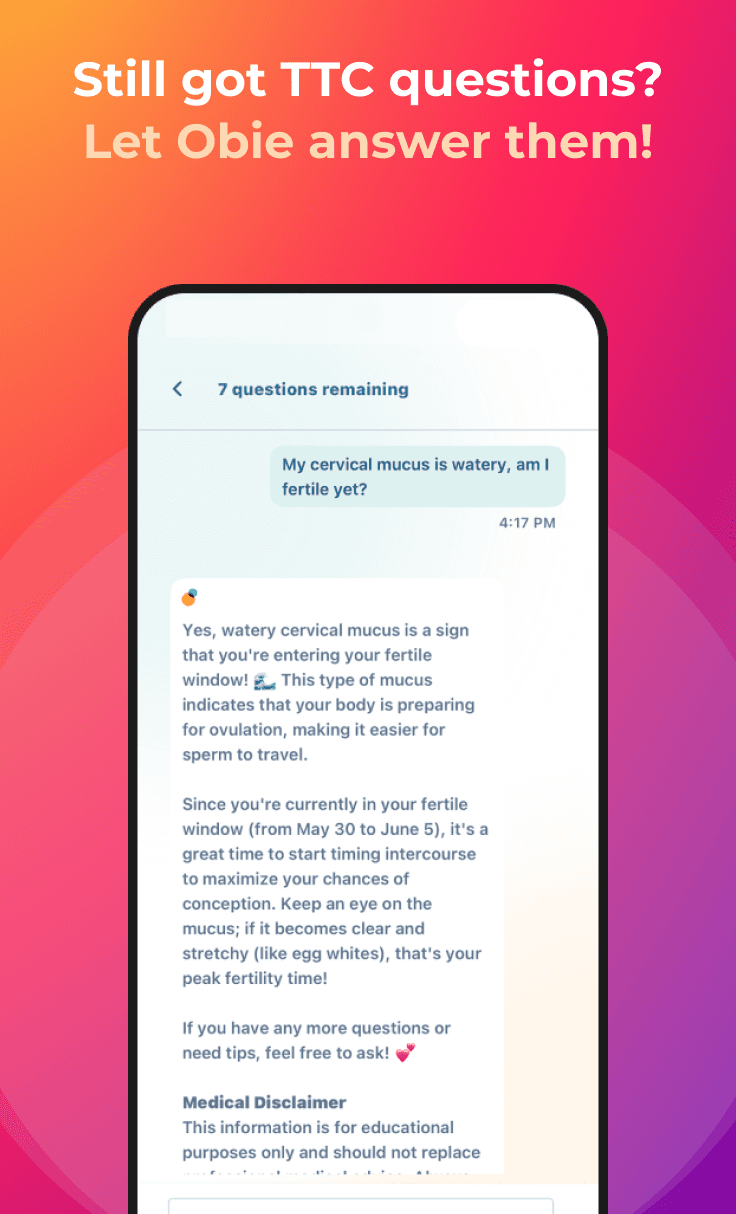Early Pregnancy Symptoms and Signs: Are You Pregnant?
Pregnancy Symptoms
Obie Editorial Team

Are you pregnant? Do the online pregnancy symptoms and signs test
Get your own personalized fertility report and find out if you're fertile!
What are the earliest signs of pregnancy?
The earliest pregnancy symptoms in the order of appearance are: implantation bleeding, implantation cramps, nausea and vomiting, tiredness and fatigue, positive blood pregnancy test, positive urine home pregnancy test, elevated basal body temperature chart, a missed menstrual period.
For most women, the very first early pregnancy sign is a missed period. Pregnancy symptoms differ from one woman to another woman and also from one pregnancy to another. Some women have many symptoms, and others have none. Many women typically report no pregnancy signs and symptoms for many weeks after a missed period, while others have symptoms much earlier.
Many women wonder how soon you can feel pregnancy symptoms, and whether you can feel implantation or conception. The simple answer: you can get early pregnancy symptoms and signs even before you have a missed period, and you may feel pregnancy signs and symptoms right after implantation.
Check out your Fertility Knowledge, and how much you know about fertility
The top 12 earliest pregnancy symptoms in the order of appearance:
- Implantation bleeding
- Implantation cramps
- Nausea and vomiting
- Tiredness and fatigue
- Positive blood pregnancy test
- Positive urine home pregnancy test
- Elevated basal body temperature chart
- A missed menstrual period
- Breast tenderness
- Mood swings and emotional changes
- Frequent urination
- Difficulties sleeping
Scroll down to see each symptom explained as well as a handy timeline chart of early pregnancy signs.
Implantation bleeding
Implantation bleeding happens on average 9 days after ovulation about 4-5 days before the next bleeding. Just a few days after conception, on average 9 days after ovulation/fertilization with a range between 6-12 days, the fertilized egg implants in the uterus. This is when the first physical signs of pregnancy begin. Women may first feel cramping. If spotting occurs, it may not show until several days after implantation. Spotting during this time can be implantation bleeding and can be mistaken for your period, but it is not as heavy as your period. Check the implantation calculator for the exact day when you should expect implantation bleeding.
Around the same time, women may feel changes in their breasts, including swelling, tenderness, tingling, and breasts feel heavier or full. Progesterone levels rise during conception, which can cause fatigue. Estrogen levels also begin to rise which can cause the stomach to empty more slowly, resulting in nausea and loss of appetite. Often called morning sickness, the term isn't quite accurate since "morning sickness" can occur at any time of the day, not just in the morning hours. Reduced blood sugar and blood pressure can lead to dizziness and fainting. Some women experience these feelings, think they are sick, and go to the doctor only to discover they are pregnant.
Vaginal spotting
When ovulation and fertilization have occurred, the fertilized egg travels down the fallopian tube towards the uterus where implantation takes place, about 6-12 days after fertilization. At that time, the fertilized egg implants itself to the wall of the uterus. Implantation can cause one of the earliest signs of pregnancy: implantation spotting, bleeding, and sometimes cramping.
Cramping
The cramps in your lower abdomen may resemble menstrual cramps. Bleeding and spotting may initially be similar to menstrual bleeding, so it's not unusual if some women mistake them for the start of their menstrual period. White milky vaginal discharge is among the first pregnancy signs.
Vaginal discharge
Besides bleeding, a woman may notice white, milky discharge. This discharge could be related to the pregnancy hormones which lead to the thickening of the vagina's walls, which begins almost immediately after conception and implantation. This vaginal discharge can continue throughout pregnancy, is typically harmless, and doesn't require treatment. However, if there is a foul odor related to the discharge, or a burning and itching sensation, ask your doctor to rule out a yeast or bacterial infection.
Cervical mucus plug
Besides an increase in vaginal discharge, observing a cervical mucus plug may be among the early pregnancy signs.
Breast changes
Breast swelling, size changes, or tenderness can be another very early sign of pregnancy. The swelling, which signals an increase in fat reserves and milk gland size, may be accompanied by soreness.
"All day" sickness, nausea and vomiting during pregnancy (NVP)
Morning sickness is probably the best known of the early pregnancy symptoms. Nausea may be more common in the mornings because stomach acids build up overnight, but most women who get morning sickness also feel nauseous at other times of the day.
Check here to assess the severity of your nausea and vomiting in pregnancy (NVP) online
Sickening scents
Even before nausea kicks in, some women develop an extremely-heightened sense of smell. Scents can become so overpowering, some women avoided cooking and other activities in which strong odors are present for several weeks.
Exhaustion
Need a nap or can't stay awake? Fatigue is one of the most common early pregnancy signs. Blame rising progesterone levels in the first trimester. Fatigue may subside with your second trimester but may resurface later on. Carrying around all that extra weight can make you tire easily in the third trimester.
Bathroom breaks
Frequent urination is another early pregnancy symptom most expectant moms know all too well due to hormonal changes early on. Later in the pregnancy, frequent bathroom breaks are often caused by an enlarged uterus (and the rapidly growing baby inside) putting pressure on the bladder.
Itching
Itching is a very common complaint and can occur throughout pregnancy. The usual areas are the breasts and abdomen, where the skin is stretching to accommodate your growing shape.
Changes in digestion
Many causes affect digestion during pregnancy:
- Increase in the hormone progesterone
- Increased water absorption in the large intestines
- Iron supplements
- The pressure of the uterus on the rectum
- Heartburn
Allergies
Seasonal allergies and asthma may become unpredictable during pregnancy. Some women see their symptoms improve, while others notice the opposite. Expectant moms with asthma generally should continue using their inhalers. If you don't breathe, your baby won't either.
Early pregnancy signs timeline
Changes occur in the female body as soon as conception occurs, but these changes cause no physical changes until about one week after pregnancy. From that point until the end of gestation, physical changes can be felt throughout the pregnancy.
(Scroll down to see a complete timeline of pregnancy symptoms and signs)
- 6 to 12 days after conception: Implantation of the fertilized egg may cause cramping.
- 7 to 14 days after conception: Breasts may feel swollen, sore, tingly, and heavy.
- 7 to 14 days after conception: Fatigue due to increased progesterone, low blood sugar, and low blood pressure.
- 7 to 14 days after conception: Increased estrogen and slowed gastric emptying may lead to nausea known as morningness.
The time frame in which women report feeling the first signs of pregnancy varies widely as different bodies change at different rates. Typically, the first signs of pregnancy are not recognized as being associated with pregnancy until after a positive pregnancy test or a missed menstrual cycle.
- Implantation Day: Temperature drop (dip)
- 9+days after ovulation/fertilization: Implantation bleeding or spotting: (a slight staining of a pink or brown color)
Pregnancy Symptoms |
Timing of Pregnancy Symptom
|
Temperature drop (dip) |
Implantation day |
Implantation bleeding or spotting: (a slight staining of a pink or brown color) |
8-10 days after ovulation |
Thick White or Milky White Vaginal Discharge |
8-14 days after ovulation/fertilization |
Cervical mucus or mucus plug and bloody show |
shortly after implantation |
Lower abdominal cramps / Implantation cramps / hot flashes |
8-10 days after ovulation |
A positive blood hCG pregnancy test |
10 days after fertilization/ovulation |
A positive urine home pregnancy test (HPT)
|
10-14 days after ovulation/fertilization |
An elevated BBT |
15+ days without a menstrual period |
No period. A missed menstrual period
|
Your period is supposed to come 14-16 days after ovulation |
Nausea |
2-4 weeks after ovulation |
Nipple or breast tenderness |
3-4 weeks after conception |
Fatigue and tiredness |
3-10 weeks after conception |
Vomiting |
3-10 weeks after conception |
Food cravings |
1-2 months after conception |
Frequent urination |
Usually after 1-2 months |
Softening of cervix |
6+ weeks after LMP |
Constipation |
Later |
Lower-back pain |
Later |
Breast changes |
After 14 weeks |
Fetal heartbeat on sonogram |
8-9 weeks after conception |
Fetal movements |
18-20+ weeks |
How many women have typical pregnancy signs and symptoms?
Not all women have typical pregnancy symptoms. Only about 1 in 2 pregnant women have pregnancy symptoms, and there is nothing wrong if you are pregnant and have none of these symptoms.
Very early symptoms differ from one woman to the next and from one pregnancy to the next. Some women can experience them within a week after ovulation, fertilization, and conception. Yet, others may develop much later, well after a missed period and/or positive pregnancy test. Other women may never have any symptoms at all.
While these are the most common early symptoms of pregnancy it's important to realize that many of these symptoms may be caused by other things besides pregnancy. So the fact that you notice some of these symptoms does not necessarily mean you are pregnant. The only way to tell for sure is to do a pregnancy test.
The most significant sign of a pregnancy is a late or missed menstrual period, but the only definitive diagnosis is a positive pregnancy test.
Abnormal pregnancy symptoms
With so many changes taking place in your body, you may be tempted to dismiss any new discomfort as normal during pregnancy. But certain symptoms could signal a serious problem:
- Bleeding: Bleeding is rarely if ever felt to be normal during pregnancy. Spotting is common in the first trimester and probably not a cause for alarm. However, in the second and third trimester, bleeding could provide a warning of a serious complication in advance, such as preterm labor or problems with the placenta. Always report any bleeding or spotting to your doctor or midwife.
- Severe Itching: In the late second and third trimester, severe itching may signal a rare liver problem that sometimes develops during pregnancy, known as intrahepatic cholestasis.
- Vision: Blurred vision, severe headaches, and pain in the right side of the abdomen
These symptoms, whether they occur alone or in combination, may indicate severe preeclampsia — the medical term for dangerously high blood pressure during pregnancy. Women who experience any of these symptoms should contact their healthcare provider immediately and early delivery may be necessary to avoid life-threatening maternal and fetal complications.
Top questions about early signs and symptoms of pregnancy:
- Top Am I Pregnant? FAQs
- Morning Sickness
- Could I Be Pregnant With A Period?
- Amenorrhea - Missing Your Period
- The 2WW Pregnancy Symptoms
- Cramps and Cramping Symptoms
- Nausea as an Early Pregnancy Sign
- Breast Tenderness
- Spotting
- Ovulation Symptoms
- Viable Pregnancy Symptoms
- Miscarriage Symptoms
Implantation
- Implantation Bleeding and Spotting
- Timing of Implantation Bleeding
- Is There Always Implantation Bleeding
Pregnancy Testing
- Urinalysis: Urine Test
- Home Pregnancy Test - HPT
- Blood Pregnancy Test
- Pregnancy Test: When Positive
- Normal hCG Pregnancy Hormone Levels
- False Negative Pregnancy Test
- False Positive Pregnancy Test
| Signs and Symptoms of Pregnancy | Pregnancy Likely? |
| Positive blood hCG pregnancy test | YES! |
| Positive urine home pregnancy test (HPT) | YES! |
| Gestational sac on sonogram | YES! |
| Fetal heartbeat on sonogram | YES! |
| Elevated BBT curve: 15+ days after ovulation, no period | Highly likely |
| BBT: Temperature drop (dip) | Maybe |
| No period. A missed menstrual period (amenorrhea) | Maybe |
| Implantation bleeding or spotting:(a slight staining of a pink or brown color) | Maybe |
| Lower abdominal cramps / Implantation cramps / hot flashes | Less likely |
| Nausea | Less likely |
| Just "feeling" pregnant | Maybe |
| Strange Cravings | Less likely |
| Darkening of areola (area around breast nipple) | Maybe |
| Changes in libido | Less likely |
| Nipple or breast tenderness | Maybe |
| Fatigue and tiredness | Less likely |
| Vomiting | Maybe |
| Food cravings | Less likely |
| Frequent urination | Less likely |
| Softening of cervix | Maybe |
| Constipation | Less likely |
| Lower-back pain | Less likely |
| Montgomery's Tubercules | Maybe |
| Skin Changes | Less likely |
| Fetal movements | Maybe |
| Enlarged Abdomen | Maybe |
| Change in uterine shape | Maybe |
| Colostrum from Breasts | Maybe |
| Stretch Marks | Maybe |
| Braxton Hicks Contractions | Maybe |
| Enlarging Uterus | Maybe |
| Palpation of the Baby | Yes |
Read More









